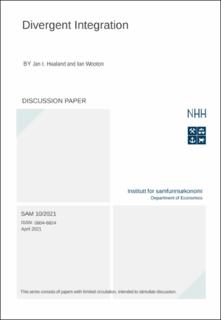Divergent Integration
| dc.contributor.author | Haaland, Jan I. | |
| dc.contributor.author | Wooton, Ian | |
| dc.date.accessioned | 2021-04-19T08:08:29Z | |
| dc.date.available | 2021-04-19T08:08:29Z | |
| dc.date.issued | 2021-04-16 | |
| dc.identifier.issn | 0804-6824 | |
| dc.identifier.uri | https://hdl.handle.net/11250/2738260 | |
| dc.description.abstract | Trade liberalisation is often characterised as either preferential or non-discriminatory but not all preferential trade agreements are the same. We focus on non-tariff measures that can constitute barriers to trade and that differ between free-trade agreements (FTAs) and customs unions (CUs). In particular, we investigate the role of rules of origin (RoO) in restricting market access for nations excluded from a CU. We develop a simple general equilibrium model characterised by trade in intermediate and final products and use this to examine the implications of binding RoO in an FTA on market outcomes and the welfare of agents in the economy. We highlight the phenomenon of “induced trade diversion” where RoO can result in countries losing from preferential market access. | en_US |
| dc.relation.ispartofseries | DP SAM;10/2021 | |
| dc.subject | Preferential trading; non-tariff measures; rules of origin | en_US |
| dc.title | Divergent Integration | en_US |
| dc.type | Working paper | en_US |
| dc.source.pagenumber | 22 | en_US |
Tilhørende fil(er)
Denne innførselen finnes i følgende samling(er)
-
Discussion papers (SAM) [655]
